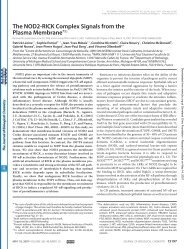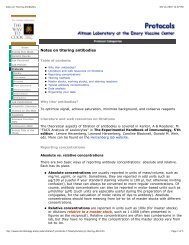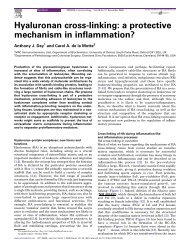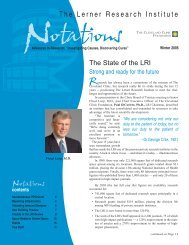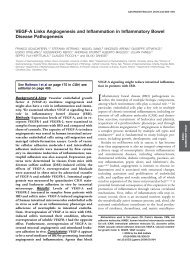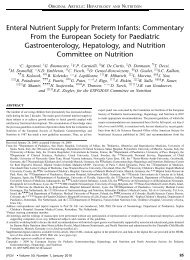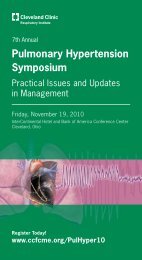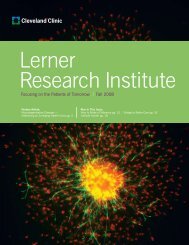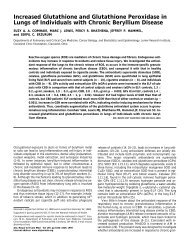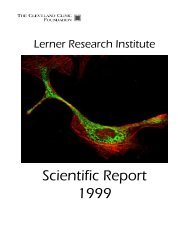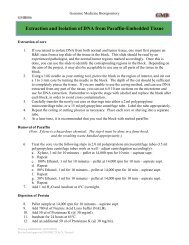Scientific Report 2003-2004 - Cleveland Clinic Lerner Research ...
Scientific Report 2003-2004 - Cleveland Clinic Lerner Research ...
Scientific Report 2003-2004 - Cleveland Clinic Lerner Research ...
- No tags were found...
Create successful ePaper yourself
Turn your PDF publications into a flip-book with our unique Google optimized e-Paper software.
THE SIZEMORELABORATORYRESEARCH FELLOWSAnju Agarwal, Ph.D.Kingshuk Das, M.D.RESEARCH ASSOCIATEKwok Peng Ng., Ph.D.SENIOR RESEARCH TECHNOLOGISTNatalia <strong>Lerner</strong>, B.S.COLLABORATORSGrahan Casey, Ph.D. 1George R. Stark, Ph.D. 2Bryan R.G. Williams, Ph.D. 11Dept. of Cancer Biology, CCF2Dept. of Molec. Biology, CCFThe Department of Cancer BiologyRole and Signaling Mechanism of thePI3K/AKT/ IκB Kinase Pathway in CancerThe overall focus of our laboratory is theinvestigation of the role of aberrant signaltransduction by AKT and IκB kinase incontrolling gene expression, oncogenesis, andapoptosis in colorectal and other cancers.Our group was the first to discover a roleof the phosphatidylinositol 3’ kinase (PI3K)/AKT cell survival pathway in the positiveregulation and the tumor suppressor PTEN in thenegative regulation of the activity of the antiapoptotictranscription factor NFκB. NFκBactivates gene products that protect cells fromapoptosis and inhibit cell death. We alsoestablished that IκB kinase (IKK) mediates thephosphorylation of NFκB in response toactivated AKT. We haverecently discovered thatIKK also regulates theactivation of anotherimportant transcriptionfactor, β-catenin. BothNFκB and β-catenin areimportant in cancerdevelopment by promotingcellular transformation,proliferation, and resistanceto apoptosis. The focus ofour current studies is onthe role and signalingmechanisms of AκT andPTEN in controlling theactivity of IkK towardsthese transcription factors,as well as the roles these transcription factors playin controlling tumorigenesis and apoptosis.Additional ongoing studies are focusing on therole of autocrine growth factor/cytokinesignaling and the identification of novel IKKsubstrates involved in the evolution of cancer.Currently, the laboratory’s efforts arespecifically focused on these goals:• To define the role and molecularmechanism of AKT in regulation of the IKKactivity towards the nuclear factor kappa B(NFκB) and β-catenin transcription factors.• To define the functional and structuralrequirements of IKK to modulate the NFκB andβ-catenin transcriptionfactors.•To identify changesin the phosphorylation andtranscriptional activity ofNFκB and β-catenininduced by IKK.•To identify NFκBandβ-catenin-dependentgenes involved in colorectalcancer development andprogression.•To identify novelmolecular targets of IKKaction.Nywana Sizemore, Ph.D.Sizemore, N., Gangarosa, L.M., Graves-Deal, R., Oldham, S.M., Der, C.J., and R.J. Coffey (1997) ARaf-independent EGF receptor autocrine loop is necessary for Ras-transformation of rat intestinalepithelial cells. J. Biol. Chem. 272:18926-18931.Sizemore, N., Cox, A.D., Barnard, J.A., Oldham, S.M., Reynolds, E.R., Der, C.J., and R.J. Coffey(1999) Pharmacological inhibition of Ras-transformed epithelial cell growth is linked to down-regulation ofepidermal growth factor-related peptides. Gastroenterology 117:567-576.Sizemore, N., Leung, S., and G.R. Stark (1999) Activation of phosphatidylinositol 3-kinase in response tointerleukin-1 leads to phosphorylation and activation of the NFκB p65/RelA subunit. Mol. Cell Biol.19:4798-4805.Rani, M.R., Hibbert, L., Sizemore, N., Stark, G.R., and R.M. Ransohoff (2002) Requirement ofphosphoinositide 3-kinase and Akt for interferon-beta-mediated induction of the beta-R1 (SCYB11) gene.J. Biol. Chem. 277:38456-38461.Sizemore, N., <strong>Lerner</strong>, N., Dombrowski, N., Sakurai, H., and G.R. Stark (2002) Distinct roles of the IκBkinase α and β subunits in liberating nuclear factor κB (NFκB) from IκB and in phosphorylating the p65subunit of NFκB. J. Biol. Chem. 277:3863-3869.60



